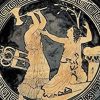As he speaks, Orestes becomes restless and agitated. He begins to feel as if he is losing his mind and insists desperately that the killing of his mother was right and that he acted according to the command of Apollo. But now, he says, he must forfeit the inheritance he has just regained, leave Argos once more, and wander as a homeless outcast.
The chorus try to comfort Orestes by assuring him that his acts were righteous. He barely hears them because he is distracted by the sight of the Furies, grim spirits of vengeance, lying in wait for him. The chorus cannot see anything and think that Orestes’ vision is the product of an over-excited imagination, but he cries that the spirits are real and are the avengers threatened in Clytaemestra’s dying curse. Orestes loses his last grip on sanity and the madness of guilt comes upon him. He calls to Apollo for help, then runs from the stage with the Furies in hot pursuit.
The chorus sadly watch Oretes go and express the hope that the gods will care for him and that he will find refuge in Apollo’s sanctuary at Delphi. They reflect on the ways the curse has manifested itself in three successive generations of the family of Atreus and ask,
Where
is the end? Where shall the fury of fate
be stilled to sleep, be done with?
The chorus exit and the play ends.
Analysis
The final scene of The Choephori has great dramatic power. In his speech to the people of Argos, Orestes releases all the emotion he has suppressed until now and gives vent to the bitterness he feels. Orestes still believes in the justice of his act, and his speech begins on a confident, optimistic note. By the end of the scene, however, he has broken down completely, his mind fails, and he is overwhelmed by a morbid sense of guilt. The intensity of this scene is increased by the dramatic use of the robe in which Clytaemestra trapped Agamemnon. The constant allusions to its netlike quality in the first two plays of the trilogy are a symbolic expression of the way the family of Atreus has been enmeshed in the confusing and inescapable web of fate.
The ending of The Choephori has many similarities to the conclusion of Agamemnon. Orestes shows the bodies, attempts to justify himself, and begins to break down, just as Clytaemestra showed the bodies, justified herself, and realized despairingly that she would not be able to escape retribution. The reference to Delphi by the chorus foreshadows the outcome of the final play of the trilogy and hints at the ultimate expiation of the curse.
The theme of The Choephori is revenge and intrigue. Despite Apollo’s intervention, the moral dilemma first presented in Agamemnon has not been solved and has resulted in more bloodshed. The chorus, representing humanity, are bewildered by the inability of anyone to challenge or redirect the inexorable hand of fate. It is clear that the old-fashioned morality does not apply to the crimes committed by Clytaemestra and Orestes, for each acted sincerely in support of a legitimate definition of Justice. Somehow, if society is ever to advance to a higher level of civilization, a way must be found to resolve the conflict of these different moral outlooks. The answer Aeschylus puts forward will be found in the final play of the trilogy, The Eumenides.

